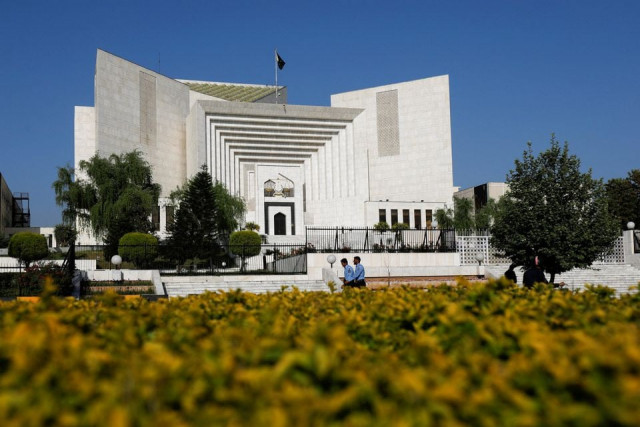SC explores link between accountability, fundamental rights
CJP Bandial observes accountability, rule of law in India linked to fundamental human rights

Chief Justice of Pakistan (CJP) Umar Ata Bandial observed on Wednesday that the process of accountability under Indian law was linked to fundamental human rights, adding that the jurisprudence treated rule of law as one of the categories of rights.
The chief justice asked whether NAB will refer to the Indian law related to the amendments.
The CJP observed this while heading a three-judge bench that had taken up a challenge filed by former prime minister Imran Khan against the August 2022 amendments to the National Accountability Ordinance (NAO).
The PTI counsels in the case have been mounting the argument that the tweaks in the accountability laws paved the way to allow people to get scot-free in corruption cases and thus, adversely impact fundamental human rights.
During the course of proceedings on Wednesday, the CJP while addressing the lawyer representing the government, Makhdoom Ali Khan, put the question of whether the latter would refer to the Indian law regarding NAB amendments.
He noted that the process of accountability had been linked to fundamental human rights in Indian law, adding that the rule of law also fell under the category of fundamental human rights in India.
Justice Mansoor Ali Shah also asked whether the Indian accountability system operated under a law identical to the one pursued by NAB and further asked whether there were ‘NAB-like’ laws elsewhere in South Asia.
“If the NAB law was good, to which extent did it benefit the country? Has any independent body formulated a report detailing the fruits of the NAB Act?” he continued asking.
In response, Makhdoom Ali Khan told the bench he would be able to answer all the questions after doing thorough research on the matter.
The CJP asked if anyone could be exempted from punishment and whether the severity of the crime could be reduced.
Makhdoom Ali Khan pointed out that PTI chief Imran Khan had not himself amended the NAB law, he also happened to be the author of a part of the NAB amendments challenged in the petition.
“There is no precedent for a person to make the amendments in the first place and then later challenge those very tweaks,” he said and recalled that Imran Khan had not participated in the debate and vote when the parliament steered the amendments into the law.
“Imran amended the law twice in 2019, thrice in 2021 and once in 2022,” he added.
The federal government’s counsel also called into question the PTI chief’s challenge to NAB amendments under Article 184-3 of public interest. “If there was public interest then why Imran did not present any bill in parliament on NAB amendments,” he asked.
He said that Imran Khan had stated that the effect of crimes had been eliminated by NAB amendments.
Subsequently, further hearing of the case was adjourned till Thursday (today).



















COMMENTS
Comments are moderated and generally will be posted if they are on-topic and not abusive.
For more information, please see our Comments FAQ